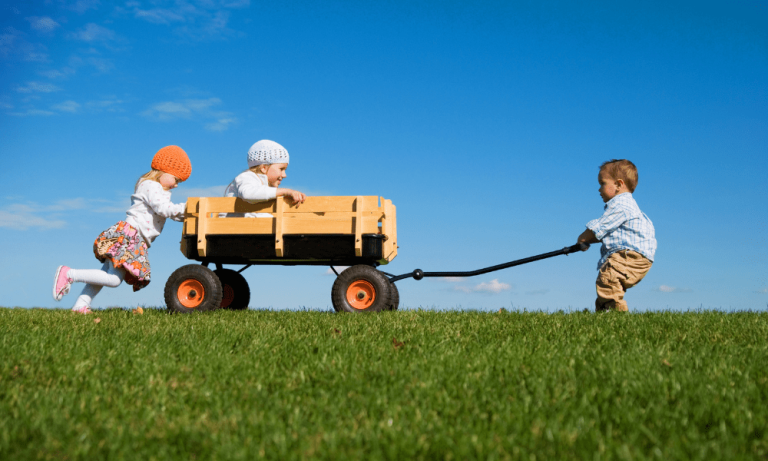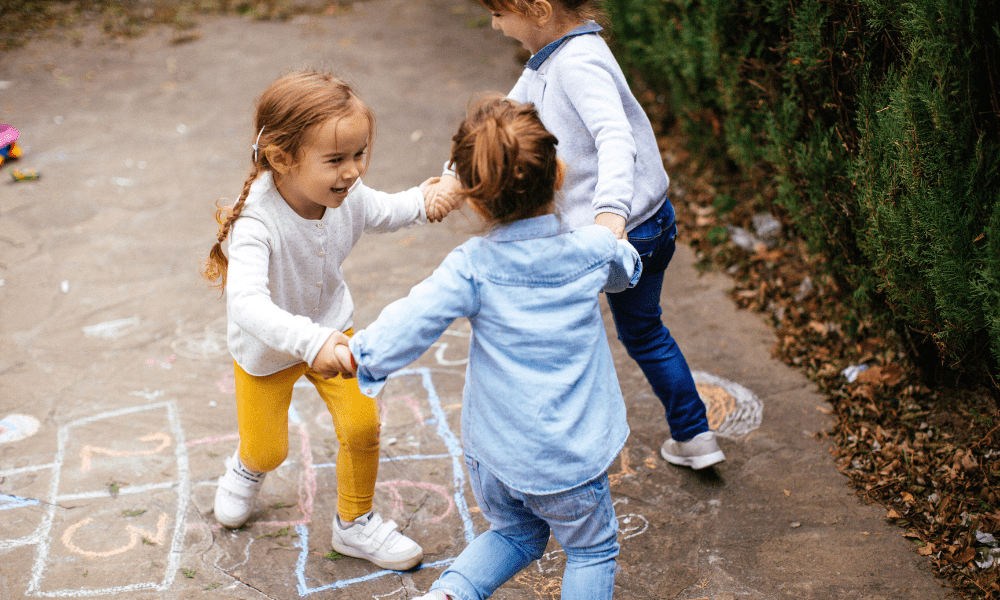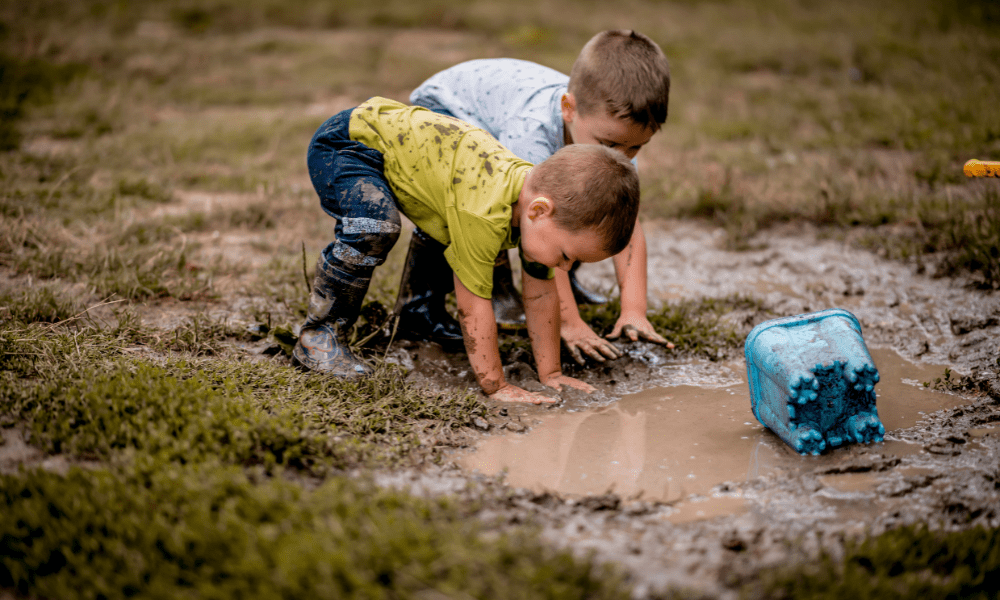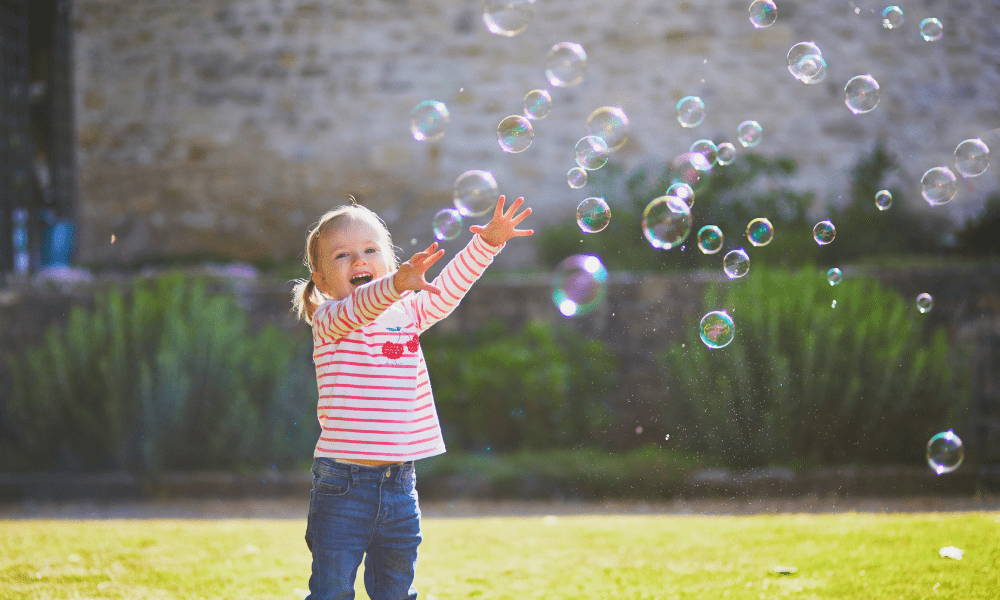Working hours
Mon - Fri: 8am to 5pm
Mon - Fri: 8am to 5pm
Menu

Cloudy with rain one moment, dazzling sunshine the next… There’s nothing quite like the British weather, is there?
Being outside is one of the most enriching activities for children, so incorporating time outside into each day is a must. The Early Years Foundation Stage framework, or the EYFS as we’ll refer to it, requires you to provide access to an outdoor play area. If you’re unable to do this, you must ensure you provide outdoor activities daily (unless this is inappropriate, e.g., in unsafe weather conditions).
But what about the rainy days? Or the intense sun of August? How can we ensure safe and engaging play all year round?
Playing outdoors isn’t just fun; it’s integral to children’s development. Let’s run through the main benefits so you can see just how important getting outside is for children.
‘Screen time’ is a hot topic in parent circles worldwide, even those of preschool-aged children. Children simply aren’t moving around as much as they used to, which makes access to outdoor play more critical than ever.
Children engaging in high levels of outside playtime…
#1 – Develop Healthy Habits
Spending time outside provides many physical advantages for children, such as promoting and normalising exercise. Given the space and fresh air to run around in, the children in your care can get their little hearts pumping and develop healthy fitness levels.
#2 – Improve Motor Skills
Children allowed plenty of outside play can develop more advanced balance and coordination skills. There are different challenges outside; exciting, physical risks to take that challenge children’s growing bodies, like throwing, swinging, running and balancing.
#3 – Boost Their Mood And Immune System
Getting enough vitamin D all year round means children’s bodies can more effectively build healthy bones and teeth, as well as other improved functions. Not just that, but fresh air, whatever the weather, bolsters their immune systems and enhances the way they’re feeling.

Time spent outdoors doesn’t just nurture the physical development . Here are just some of the advantages of clocking plenty of outside hours.
#1 – Improved Executive Function
Executive function refers to the way children’s brain works and how they can self regulate – skills such as planning, multi-tasking and prioritising. Studies have shown that lots of outside play stimulates children’s brains in these areas at a higher level.
#2 – Better Attention Span
The natural self-direction that comes hand in hand with unstructured play, especially when experienced outside, develops children’s ability to focus for longer periods because they can follow their interests and self-direct their learning.
#3 – Reduced Stress
Getting outside helps to reduce the amount of stress hormone – cortisol – in the brain and body. Outdoor play encourages physical activity, which releases endorphins and promotes a positive mood. When children engage in active play, such as running, climbing, or playing games, their bodies produce “feel-good” chemicals that reduce stress and increase feelings of happiness and well-being.
There are plenty of advantages to be found in this area of development too. Increasing the amount of time children have access to self-directed outdoor play fast their development in these key areas:
#1 – Communication
With a larger space outside to move around in, the overwhelming big feelings that can stem from noise, sensory overload and conflicts is heavily reduced because the child can physically remove themself from such situations if it feels overbearing. This means that children can feel more comfortable more often, and happy children process and share their feelings more readily.
#2 – Observational Skills
There is so much to see outside. Children who are allowed to spend self-directed playtime outdoors can spend as much time as they’d like developing observational skills that will serve them well at school and beyond.
#3 – Appreciation For Nature
Spending time outdoors as a child nurtures a deep love and care for the environment as an adult. The captivating sights of birds, bugs, mud, and puddles, along with all the wonders nature offers, become nourishment for the soul. These experiences create a strong connection with the natural world, fostering empathy and a sense of responsibility. Such childhood memories become a driving force to protect and cherish the environment as we grow older

So outside play is crucial. We can agree on that. But what if it’s a hot, sticky summer’s day?
Here are some great ways you can keep children cool without stunting their outdoor time.

Children don’t dissolve in the rain, and outdoor play should not stop just because the heavens have opened. Think about these ideas when the forecast looks wet.
Low temperatures can make activity planning tricky for nursery practitioners. Children will always find their groove when given the space and time to play without direction, but here are some back-pocket ideas if you need them.
The value of outdoor play is inarguable, but weather can present some risks that need addressing.
Extreme weather events, while exciting, are best left. Watching lightning storms from the window is far safer than standing in it!
In the height of summer, hats and sunscreen should be used regardless of the time spent outside. Children’s water bottles should be on hand at all times to prevent dehydration, and avoiding the hottest part of the day is always advised.
In the wetter months, appropriate clothing is a must. Wellies, waterproofs and warm clothes will keep children happy and dry and able to play for longer. Umbrellas, whilst a lot of fun, should be used with caution, and plenty of spare clothes are useful for the unavoidable splash here and there.
Cold-weather clothing is integral to fun in the fresh air when the temperature drops. Hats, gloves and scarves – paying attention to loose ends that might get caught – are musts, and time should be limited. Getting toasty inside afterwards with warm drinks is a lovely practice to include on chilly days, too.
The benefits of being outside are too good to miss because of the weather – especially in our changeable climate!
Practitioners can provide the children in their care with outdoor opportunities every single day of the year by engaging in plenty of preparation and risk-assessing outdoor activities ahead of time.
Getting outdoors, whatever the weather, is just one of the many benefits children in day nurseries access. Are you effectively marketing the real benefits of your early years setting? Read this blog to find out.
With the ever-changing regulations and guidance, join our monthly newsletter to stay current and learn more about running a better childcare setting.
Simply enter your details below to join our mailing list.
"*" indicates required fields
By completing this form you are agreeing to our privacy policy You can unsubscribe at any time

Millennium House, High Street,
Studley, Warwickshire, B80 7HJ.